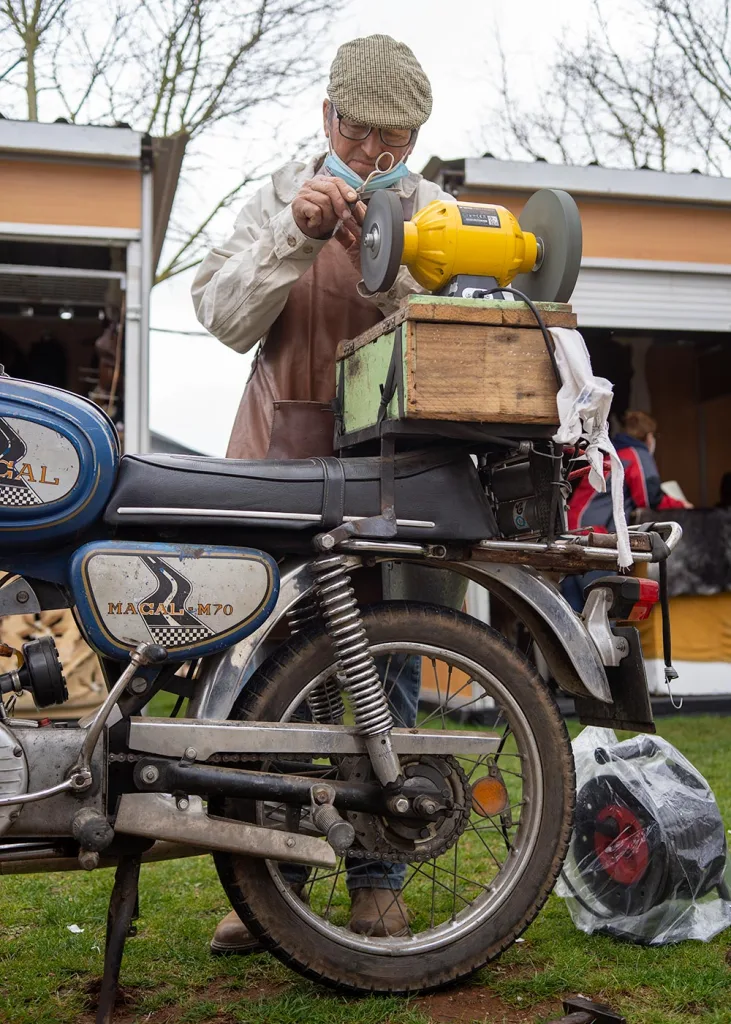The first five times I heard an amolador, I mistakenly thought it was just a neighbour with a few loose screws. After all, why would someone be wheeling a bike through the neighbourhood while piping a charming, if slightly repetitive, tune on a pan flute?
After more than a year living in Portugal, I recall peering out the window one day and seeing an old guy with grey hair. A week later I heard the distinctive tune again, and looked out to see a young man with brown hair. It was then I realised there was more to the story.
Finally I saw a man flip the back stand on his bike down and start sharpening a knife on what is actually a travelling workshop. Ah! The guys with the fairytale tune and a gruff attitude? That’s an amolador.


What is an amolador?
The amolador is a nearly extinct trade, so it’s always thrilling when one passes through the streets, still dedicated to this traditional craft and wading against the tides of time.
While most Portuguese people seem to know what an amolador is, every foreigner to Lisbon or Portugal is clueless when they first hear that pan flute song, so I wanted to write a deep dive into this curious profession in English. If you have something to add, or know something more, leave me a comment below!
Contents
ToggleWhat’s the history of amoladores?
For centuries Lisbon, and much of Portugal, revolved around roving tradesmen. From fishwives to coal peddlers, there were dozens of street vendors hawking food, supplies and home goods as they wandered neighbourhoods like a 19th-century Amazon. Every vendor had a unique call, song, or cry to announce their arrival – some with words, some with song.
Now the only one left (that I know of) is the amolador.


It’s thought that amoladores, which means “grinders”, came from Galicia, the Spanish province above Portugal. They crossed the border looking for work and now this trade is unique to Portugal. While permanent storefronts replaced the need for many amoladores in the 20th century, somehow this trade continues.
What does an amolador do?
An amolador sharpens knives, scissors, and shears, and fixes umbrellas and pots. You’ll know they’ve arrived in your neighbourhood when you hear the shrill of the pan flute echoing between homes. But it’s hard to know where they are and you have to think quick if your knives are in need of sharpening

It’s said when you hear the tune of an amolador in your neighbourhood, it brings rain in the coming days. Sure that’s because they fix umbrellas – but they also might not go walking the streets in the wet weather!
On the back of their bikes (or sometimes motorbikes) they have some sort of sanding belt to sharpen knives, powered by the turning of bike pedals.
How much does an amolador charge?
We now get our kitchen knives sharpened every few months when we hear the sweet tune of an amolador pass through the neighbourhood. Sometimes they come by frequently, other times months can pass without one coming through and then we hear three within a few weeks.
While it’s miraculously somewhat common in Lisbon’s neighbourhoods, I’ve heard their tunes are rarely heard in Portugal’s small villages and towns these days.

It seems many amoladors work with restaurants who know the sharpest knives comes from the skill of a sanding belt and not that shitty knife sharpener you ordered online.
I’d say we pay around €5 per knife. Check before sharpening because it’s not unknown for (rare, thankfully) dodgy purveyors to charge foreigners outrageous amounts.
Who still works as an amolador?
Most recently I met Fábio Lourenço, a young guy aged just 33 who started learning the trade at a young age from his father, the latest in a line of sharpeners stretching back to his great-great-grandfather. I’d actually seen a video on CNN about Fabio, originally from the Alentejo, who was sharpening knives in the middle of Viana do Castelo in Portugal’s far north.


One Saturday I heard the distinctive tune of the amolador and peering out my window, looked down to see Fábio had parked right outside our apartment and was repairing an umbrella – something I’d not seen before. Not every amolador plays the tune quite as well, and Fábio certainly has a strong set of lungs and a knack for the flute.
He and his partner are travelling the country north to south with their bikes, offering their services. I feel lucky to have bumped into them!


Keep reading…
- 25 traditional dishes to order in Portugal
- Cork masks, a burning effigy and plenty of wine: the traditional Schist Villages carnival
- Best tiles in Porto: Where to find Porto’s most beautiful azulejos
- 15 best things to do in Viana do Castelo
- 20 best things to do in Évora, the Alentejo capital
- The best Portuguese cookbooks in English







